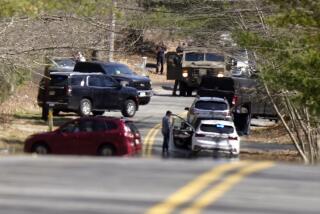U.S. Shared A-Secrets With France : White House Disputes Contention That Action Broke Law
- Share via
WASHINGTON — The Bush Administration on Saturday confirmed that the United States has discreetly shared some nuclear-weapons information with France since 1972, but it disputed a published report that the cooperation violated U.S. law.
In an article published Saturday, Princeton University Prof. Richard H. Ullman maintains that the cooperation was a “covert” arrangement that “almost certainly has violated U.S. law.” But he added that the arrangement has also strengthened the nuclear deterrent available to the North Atlantic Treaty Organization and has helped reverse the ill effects of French President Charles de Gaulle’s 1966 decision to pull France out of the alliance’s unified military command.
A statement issued jointly by the Bush White House in Rome and by the State Department here pointed out that the cooperation with France dates back to 1961, when the John F. Kennedy Administration reached a formal agreement with France to exchange some classified information “concerning training, military planning, protection against nuclear-weapons effects and operation of delivery systems.”
Accord Suspended in 1966
That agreement was suspended in 1966, after De Gaulle marched the French military out of NATO and ousted the alliance headquarters from Paris. But the arrangement was resumed in 1972, during the Richard M. Nixon Administration, and it was further expanded in 1985 in an amendment to the 1961 agreement.
The U.S. statement Saturday said that the 1985 amendment allowed “exchanges of certain classified information related to the safety, security and reliability of nuclear activities and installations.”
The statement went on to insist that the relation with the French, extending back 28 years, “has been entirely consistent with the terms of the Atomic Energy Act of 1954, as amended. . . . While this cooperation has been confidential, it is a mistake to label it as covert (because) this cooperation takes place with the full knowledge of both governments and does not involve activities of an intelligence nature.”
In his article, in the Washington-based periodical Foreign Policy, Ullman not only calls the exchange covert but insists it was in violation of a 1958 amendment to the Atomic Energy Act that, by implication, limited American nuclear cooperation to Britain, then the only ally with a nuclear weapons capability.
Yet in his article, Ullman also concedes that after the Nixon decision to resume cooperation was worked out between Henry A. Kissinger, then national security adviser, and Michel Jobert, then French foreign minister, care was taken not to go beyond existing restrictions on disclosing certain types of information.
“Much of the technology involved . . . has in fact been unclassified,” Ullman writes at one point. “For the most part the exchanges have steered away from the actual design of nuclear weapons . . . so as not to run afoul of U.S. legislation. In this respect the program of assistance to France has differed sharply from the one with Britain, where weapons designs are routinely exchanged.”
What the Ullman article skirts in its assertion that laws were violated was the fact that President Kennedy asked Congress on Sept. 7, 1961, for unusually prompt action to amend the Atomic Energy Act to permit exchanges of sensitive information with the French. Acting under pressure after the Berlin crisis of that summer, Kennedy explained that the exchanges “will make possible effective cooperation with France in NATO mutual defense planning and in the training of French NATO forces.”
Detailed Report
Meanwhile, on Saturday, a Pentagon spokesman issued a more detailed statement on the U.S.-French cooperation.
The United States “has cooperated with France in improving the operational effectiveness and survivability of its strategic missile systems, including supporting command and control systems,” said the spokesman, who declined to be identified by name.
“There have been several meetings involving U.S. and French technicians every year since 1972 under the terms of the 1961 agreement,” the statement from the Pentagon said.
More to Read
Sign up for Essential California
The most important California stories and recommendations in your inbox every morning.
You may occasionally receive promotional content from the Los Angeles Times.













